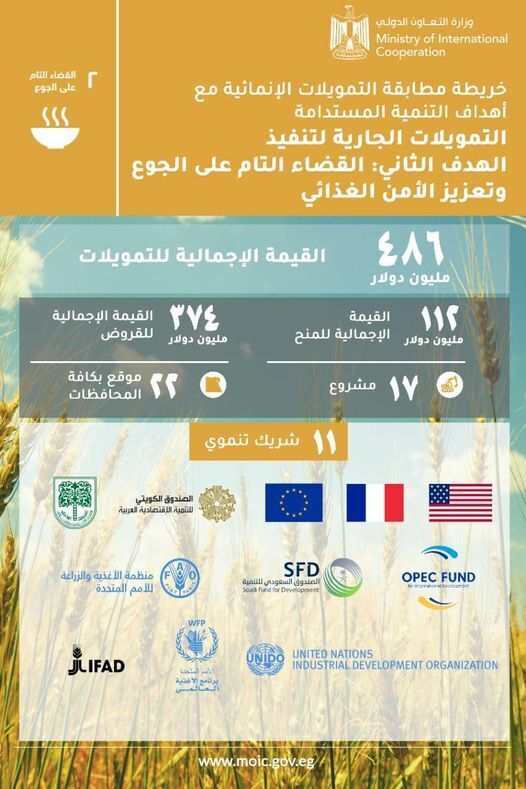By
Marwa Nassar
-
-
Egypt has secured a total of $486 million to implement 17 projects across 22 locations covering all of Egypt’s governorates to push forward on going efforts to enhance food security and achieve the United Nations SDG 2 on zero hunger.
The Ministry of International Cooperation said the funds were secured through $112 million of non-refundable grants, and $374 million provided by 11 development partners, namely the Food and Agriculture Organization (FAO), the Kuwait Fund for Arab Economic Development (KFAED), and the International Fund for Agricultural Development (IFAD), among others. These funds represent 1.89% of the Ministry of International Cooperation’s current portfolio amounting to $25.6 billion.
In line with Egypt’s agenda regarding hunger eradication and food security enhancement, the United States of America’s grant worth $72.5 million to the Ministry of Agriculture has effectuated the agribusiness development project.
The project aims to enhance the Egyptian economy’s competitiveness and inclusivity through ensuring growth in certain agricultural fields, boosting the private sector engagement, while improving agricultural products, farm productivity, and the marketing of crops. In addition, the funding by the Saudi Fund for Development (SFD), amounting to SR 427.5 million, equivalent to $114 million, supports establishing grain storage silos in a number of governorates.
The project shall enable structural reform and advance storage methods to improve efficiency, reduce grain waste, maintain production quality, and increase storage capacities to accommodate the local wheat production. The SFD finances as well the establishment of a water desalination plant worth a total of SR 362.5 million, equivalent to $96.6 million to complement the Arish plant, with a capacity of 100,000 m3/day, expandable to 300,000 m3/ day.
The Ministry of Housing, Utilities and Urban Communities takes on the implementation of the project that does not only achieve the second SDG of Zero Hunger, but also contributes to relevant goals, namely SDG8: Decent Work and Economic Growth, and SDG17: Partnerships for the Goals. The Kuwait Fund for Arab Economic Development (KFAED) provided development financing worth KWD 45 million, equivalent to $149.4 million, for the Ministry of Water Resources and Irrigation, to develop and reclaim 400,000 feddans in North Sinai.
This project achieves sustainable and wide-ranging economic growth for North-Sinai Governorate; improves agricultural productivity; promotes urban communities; and links Sinai to the delta region, turning it into a natural extension of the valley.
Dr. Rania Mashat, Minister of International Cooperation, explained that within the framework of the Ministry’s keenness to consolidate the principles of transparency and governance and enhance communication with the people, the ODA-SDG map – in light of the second principle of economic diplomacy – allowed citizens and development partners to view the details of all projects implemented across Egypt’s governorates in various sectors. Projects are grouped according to their locations and the relevant SDGs they serve.
Mashat stressed that the map enables Egypt to fulfill its development priorities by identifying what has been implemented and, consequently, pinpointing the gaps so as to direct future partnerships towards bridging these gaps. The map promotes transparent and effective communication with stakeholders and citizens to learn about the national development efforts made through international partnerships.
It is worth noting that Mashat in collaboration with the London School of Economics (LSE) launched her book titled “Stakeholder Engagement Through Economic Diplomacy”, along with the ODA-SDG map at an international event attended by eminent international economic figures and institutions. The book was highly regarded by the interventionists as a documentation of the leading Egyptian experience in international cooperation and development financing.
The participants also commended ODA-SDG mapping, as Ambassador Munir Akram, President of the United Nations Economic and Social Council (ECOSOC), said that ODA-SDG mapping is a vital step towards achieving the SDGs, and that Egypt is one of the first countries to take on this mission.
Achim Steiner, Director of the United Nations Development Program, added that 2030 is less than a decade away. Hence, countries are striving to build back better and push the SDGs, including the Arab Republic of Egypt that seeks, through the principles of economic diplomacy, to direct development financing to support its development priorities. On her part, Baroness Minouche Shafik, Director of the London School of Economics, said that ODA-SDG mapping helps demonstrate the efficiency and effectiveness of these funds in achieving development goals, by identifying and bridging the gaps through impactful partnerships.




اترك تعليقا